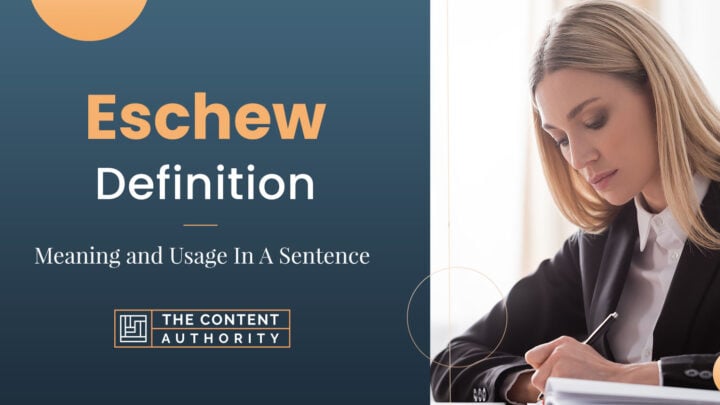Words are important to any language and are a powerful tool for communication; words can also be transformative. It is, therefore, vital to enhance your vocabulary by trying to learn a new term often. The word of the day today is “eschew,” and we will keenly look at the eschew definition, meaning, spelling, and much more.
“Eschew” is a verb defined as “to avoid doing something deliberately or to choose not to do something.” It is often used in situations where one has to give up on something. This has to be deliberate.
“Eschew” is a fascinating English word and very interesting to use. But, to correctly use the word, you need to understand it fully. Read on to understand the word better to use it confidently in your writing or conversations.
 What is the Definition of Eschew?
What is the Definition of Eschew?
“Eschew” common definition is “to abstain from something.” The word describes shunning, abstaining, or avoiding something at all costs. The word is only used when someone avoids something purposefully.
Here are some example sentences:
- Mary appealed to her children to eschew bad company.
- The community is deteriorating, and the only way to improve its operations is to eschew vices.
- The best way to prevent Coronavirus from spreading is to eschew public places or crowded areas.
What Is the Meaning of Eschew?
“Eschew”: To avoid using, accepting, being a part of, or partaking of a certain activity. Use the word to describe people who have chosen not to get into certain things or behaviors.
The word describes avoiding morally wrong things or someone that has chosen to be wrong or bad. Note that the word is mainly used to mean staying away from something because you do not like it. However, it could also mean staying away from something because its effects on you are not good.
An example is a dieter who stays away from cake because they want to avoid the impact it might have on the waistline. More so, you can talk about contractors who avoid hiring casuals without construction knowledge.
Here are some example sentences:
- Young people should eschew drugs if they want to live a healthy future.
- The environmental department has a perfect plan to screw the pollution from the local industries.
- You can easily tell players who want to eschew the game by watching the first half.
Meaning of Eschew in Religion?
So, what does this word mean when used in religious contexts? The meaning varies based on word phrases. For instance, “eschew evil” means to keep away from or shun evil. This is a common phrase in regions where one is urged to stay away from bad or evil activities and even some people.
What is the meaning of eschew in the bible? The King James Bible mentions “eschew” four times. In all this time, the word’s meaning is “to turn away from.” The term mostly urges Christians to avoid evil and turn to good.
Words Related to Eschew
One feature that makes the English language unique is that words can be related in one way or another. Some words could have the same origin, meaning, opposites, or even rhyming sounds. Here is a look at some of the words that relate to eschew.
Words with the Same Meaning As Eschew
Here are a few synonyms of the word eschew.
- Shun
- Avoid
- Duck
- Deny
- Disclaim
- Keep clear off
- Abstain from
- Cease
- Refrain
- Belay
- Kick
- Forbear
- Despise
- Detest
- Scorn
Words Opposite of Eschew
- Participate
- Contribute
- Join
- Partake
- Engage
- Join in
- Take on
- Keep
- Follow
- Explain
- Aid
- Confront
- Continue
- Endure
- Restart
Words Rhyming With Eschew
Here are some words with similar sounds as eschew
- Interview
- Review
- Rescue
- Queue
- Tissue
- Virtue
- Pursue
- Argue
- Barbecue
- Corkscrew
- Statue
- Curfew
- Ensue
- Mildew
- Worldview
How to Use Eschew in a Sentence
Before using the word eschew in your sentences, ensure you understand the best way to use it. Eschew is a verb that means dread or shuns. In a sentence, “some people eschew things that they find morally or aesthetically wrong.” You can also use this word as a noun. Learn more from the word forms below.
Word Forms of Eschew
Eschewal: This is the noun form of eschewal, and it means the act of avoiding something.
Here are some example sentences:
- Harriet is a student who many admire her eschewal from bad company and how she put all her focus on her studies.
- Due to the high divorce rates, there is an increase in eschewal of relationships and marriage.
Eschewing: This is the verb form of the word eschew. It means to avoid or deliberately stay away from something or someone.
Here are some example sentences:
- The medication is designed to help you lose weight without eschewing your favorite foods.
- They never thought how eschewing their traditions would affect their relationship with the community.
- Without eschewing the policy, the students found a loophole that they could use to miss classes without any consequences.
Eschewed: This is the past tense and past participle of eschew.
Here are some example sentences:
- I eschewed visiting the city; the last time I was there, robbers attacked me.
- I eschewed going to school reunions since I did not want to meet with my ex.
- John eschewed visiting his father because he is a vile and violent man.
Eschews: It is the third person present of eschew.
Here are some example sentences:
- The television station strictly eschews any political discussions.
- The school eschews the use of vulgar language by the teachers.
- Gabriel eschews any form of contact since the coronavirus pandemic.
10 Examples of Eschew in a Sentence
Reading sentences with the word eschew will help you know and understand the word’s usage. Read these ten sentence examples with the word eschew.
- She decided to eschew dating until she found someone who would be their partner for life.
- James chose to eschew the mistake he had made in the past so that he could change his lifestyle.
- Jane has decided to eschew taking alcohol or going to parties that serve hard drinks.
- Since I knew Peter’s bachelor party would be wild, I chose to eschew going and instead decided to have a quiet night in the house.
- Though he is a trained doctor, he chose to eschew this profession and instead focus on farming.
- Pete is known to be a comic, but when in the office, he is serious and will eschew anything that might destroy his career.
- The couple has chosen to renew their vows and eschew any behavior that might destroy their marriage,
- Nancy was the first person to chew the traditional teachings of our ancestors; he went overboard by choosing to be a priest.
- Do not be a physician who eschews methods that have been successful in the past.
- Some vegetarians are also vegan, which means that they eschew all products from animals.
How Do You Spell Eschew?
Spell “eschew” as “E.S.C.H.E.W.”
The spellings you use when pronouncing a word will help determine how people translate or review your message. If you want to have the most impact with your written language, ensure that you use the correct spellings.
How Do You Pronounce Eschew?
The American pronunciation is “uh-shoo,” while the British articulation is “uhs-choo.”
Before you learn how to pronounce the word “eschew,” you should note that there are American and British pronunciations. So, take the time to practice the pronunciation you will use.
The main difference between the two pronunciations is that the British exclude the “c” sound when pronouncing the word. Keep in mind that poor diction or using the wrong pronunciation will lead to miscommunication or misunderstanding.
How Many Syllables Are In Eschew?
“Eschew” has two syllables divided as “es and chew.” The stressed syllable is “chew.”
History & Etymology of Eschew
Eschew is one of the few words that have refused to become extinct in the English language. The origin of the word is German “sciuhen,” meaning “to frighten off” or “shy.” The word was later borrowed by the Anglo-French and used as “eschiver” but retained the same meaning.
It was later introduced to English as “eschew,” meaning to shun or avoid habitually. But in 1755, Dr. Samuel Johnson, a lexicographer, chose to characterize the word “eschew” as almost obsolete. However, before the word completely went extinct, William Thackery revived it by including “escrow” in the classic novel “Vanity Fair.” Since then, the term has been used often, its peak being in the 19th and 20th centuries. The word is very common today, such that it is now included in the many dictionaries.
 When Was Eschew First Used?
When Was Eschew First Used?
The first use of “eschew” was in the 14th century. It is one of the oldest words with a very rich and exciting history.
Conclusion
“Eschew” means deliberately avoiding something. This word has survived the test of time. One more thing: Before you start using the word, you need to take your time to practice it to be certain that you fully comprehend its meaning and definition. Start practicing internally before presenting it to a large crowd.
Shawn Manaher is the founder and CEO of The Content Authority. He’s one part content manager, one part writing ninja organizer, and two parts leader of top content creators. You don’t even want to know what he calls pancakes.

